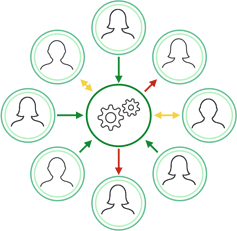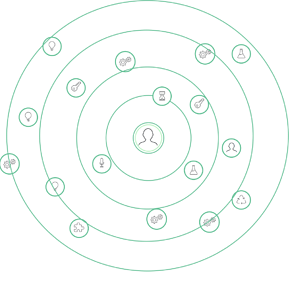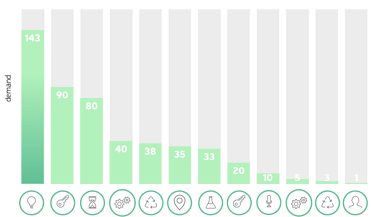WΞQUEST
Building A Collaborative Resource Sharing ‘WE-conomy’
white paper (draft V 0.1)
![]()
Ideas and concepts contained in this paper are currently released under a Creative Commons Attribution-NonCommercial-NoDerivatives 4.0 International License.
“You never change things by fighting the existing reality.
To change something, build a new model that makes the existing model obsolete.”
** Buckminster Fuller*
Abstract
WeQuest is a decentralized application (DApp) designed to create a digital, globally connected sharing economy which encourages collaboration above competition. It is designed to help people connect with each other based on their location and their actual needs, to exchange goods and provide services in a more efficient way than is currently the case whilst doing this without the need for money. It transforms the sharing economy into a unified but decentralized Universal Sharing Network, fully owned by its community of users.
Via a simple to follow user interface, directly accessible from any web-enabled device; users can submit geo-located requests for any good or service. These requests are published in a public and globally accessible ledger where they can be discovered and satisfied by local and global providers, in exchange for digital tokens. These tokens can in turn be used to request other goods or services on the platform, and to vote on proposals which will benefit the collective. The token reward is computed by the platform, ensuring a fair and practical economy at a local and global scale.
Introduction
Around the world, emerging technologies are accelerating the transfer of power from centralized institutions to distributed networks driven by voluntary peer-to-peer collaboration.
Current ‘sharing economy’ initiatives (AirBnB, Uber, TaskRabbit, etc…) showcase the possibilities of peer-to-peer sharing on a global scale. However, they can be considered as a new middleman between a buyer and seller, extracting value from the exchanging peers. Therefore, these initiatives only represent the beginning of a transition in the evolution of the sharing economy, a proof of concept still embedded within a monetary framework.
With the disintermediation possibilities offered by blockchain technologies, we have the opportunity to create a digitally-driven world where goods and services are exchanged without unnecessary middlemen, and where rewards and prices are automatically and fairly regulated.
With WeQuest, the power of Executable Distributed Code Contracts (Smart Contracts) is used to facilitate a transparent and trustworthy peer-to-peer exchange of assets and value, thus reducing the need for trust brokers extracting value from the transactions.
With this article, we disclose the design for a global system centered on collaboration towards the fulfillment of “Quests”, dictated by the geolocalized requests of its users. WeQuest represents the first step of a transition plan towards a globally collaborative future where human and planetary resources are intelligently allocated and exchanged for the satisfaction of everyone’s need.
Ultimately, WeQuest aims to connect all sharing economy initiatives into a single, universal resource sharing network, owned and operated by the economic participants themselves.
This is achieved through the creation of the first demand-driven marketplace for human needs, where decentralized autonomous cooperatives (DACs) regulated by liquid democracy can aid in the provisioning and where human contribution is valued by a novel and fair valuing system.
One need, one global quest.
For each new need, WeQuest creates an open, decentralized digital collective focused upon global provisioning. Only one cooperative for each unique need can exist within the platform, thus everyone in the world asking for the same good or service will be tapping into the same collective. This avoids the need to create different cooperatives/initiatives, in turn reducing competition.
Information about the geolocation of the need is attached to each request, so that WeQuest is able to function on both a global and local scale (gLocal) and it is oblivious to socio-political boundaries.
Participation in the cooperative can take three forms: Provider, Consumer or Prosumer (both provider and consumer). The provider satisfies the geolocalized need indicated by the consumers (for instance, by providing their time and car to fulfill a cab ride). The prosumer, on the other hand, might collect fulfilled quest tokens to obtain the exact same service (driving around for 50 km will give her the right to be driven around for 50 km).
A demand driven economy
Instead of advertising services or products that are locally available, WeQuest focuses on globally “advertising” the location of their demands. Close and far away providers can see the collated demands, and are free to choose which one they are willing to provide.
When the request is accepted, a connection between the provider for the resource (i.e. goods and/ or services) and the consumer is made. WeQuest makes it more convenient and rewarding to choose closeby source products, local neighbouring providers will have a greater chance of being selected compared to global providers, effectively enabling economical re-localization.
Technologies of Trust
The Ethereum network is used as a public decentralized ledger to safely store and track these requests, to make them visible at a global level, and to help resolving a potential dispute.
The transparency provided by using a public ledger is used to share the information that will be needed to create the best optimization plans. As no information is hidden, this platform is able to create a global collaboration network and perfect competition to fulfill the need at a local and global scale.
The study of the historical transactions data will give great insights on the provenance of the resources, and will also predict scarcity or overproduction. In turn, that information can be used to incentivize or discourage the production at the right time and place, achieving a maximum collaborative efficiency which would have never been possible in a non-transparent, competitive ecosystem.
Tokens and Rewards
In order to create a new valuing system, it is necessary to go back to a redefinition of how to think about value of the human contribution, and how that can be different than the contribution of a machine. WeQuest uses three different means to value human contribution: Time, Reputation, and Karma.
-
Time:
Time is the most valuable human resource. Everyone is born with it, and it’s valued the same everywhere. Fulfilling a service for one hour will grant one hour credit, which can then be used to pay for other human services within the platform. However, this fair amount does not consider the quality of service provided, therefore we are in need of a second layer, that is, Reputation. -
Reputation:
Reputation is assigned at the end of each transaction. At parity of cost and distance, a consumer will likely choose the provider with the highest reputation. It is therefore in the interest of the provider to give the best quality of service in order to maximize his or her reputation. The historical data of the reputation points after each transaction creates a permanent and verifiable curriculum and therefore an online identity based on the quality provided. -
Karma (Community Points):
Providing for something in higher demand means that the contribution has been more valuable for the community. If you have contributed the most to the community, it is fair too for the community to give you back as much. The more positive social impact you contribute, the more “karma” you will have. Therefore, the amount of reward is self-regulated by the platform, starting from the amount of the local demand for the specific good or service. Karma can then be used to request other products and service “rewards” from other peers on WeQuest.
Smart Barter
WeQuest creates an ecosystem where digital cooperatives are able to easily cooperate and interoperate. The pizza cooperative, for instance could easily make use of the services of the transportation cooperative, but could also order the ingredients from the tomato, flower and mozzarella cooperative.
These rules also define how value obtained in one cooperative can be exchanged for goods and services in another.
If the product or service provided is similar, cooperatives can submit merger proposals to other cooperatives, or can simply forward specific requests.
Treasury and Self-Financing
One of WeQuest’s core targets is to create an environment that will allow it’s cooperatives and the system itself to be sustainable and thus financially viable.
Since the decentralized cooperatives are owned by its stakeholders, each cooperative will have its own democratic governance structure and money flow.
For every service transaction, the cooperative will withhold a small fee in its digital treasury. The exact percentage is democratically agreed upon by voting on a proposal. The more people will request resources from the cooperative, the more the cooperative will have the power to improve or even automate its services.
All collected funds will be digitally held by each of the cooperative’s smart contract. Its prosumers will be able to democratically decide how to spend accumulated funds, by voting on user-submitted cooperative improvement proposals (CIPs).
CIPs (cooperative improvement proposals) can be submitted by anyone who uses the cooperative. CIPs are used to assign the social capital collected by the cooperative to the proposal which are believed to be positive for the entire cooperative, making sure that funds are allocated to the improvement of the cooperative, and ultimately to its automation.
If the proposal passes, the requested funds will be assigned to the beneficiary to execute it. Note that the beneficiary might also be another cooperative.
The value in the treasury of the cooperative will be assigned democratically in order to incentivize the use of the collected funds, 1% of the funds held in each cooperative at the end of a calendar month will be transferred to cooperative.
In this way cooperatives are incentivized to assign the funds to proposals every month.
Increasing adoption of our system as a whole will generate an increasing amount of funds, to be used in community-accepted proposals for the outreach and betterment of our platform and services.
Therefore, by means of this built-in value-feedback loop, each cooperative will be built, improved and sustained by its users.
Governance and Liquid Democracy
Each formed collective has its own decision power structure across its participants. Voting on proposals is weighted by the amount of reputation the participant has collected.
The most active consumers will have more voting power over the product specifications and required certifications while the providers with higher reputation will have more voting power over the allocation of the funds collected by the cooperative. The user can vote directly to the proposal, but can also choose to delegate his reputation to anyone else within the same cooperative. The delegate, in turn, can choose to further delegate his reputation (together with the reputation which was delegated to him). A liquid delegation structure easily emerges, where a decision on proposals can be taken by the most active and trusted representatives in the collective. At any point, the user can decide to take back his delegation and assing his reputation directly to the proposals, creating a the opportunity fluid transition between direct and delegative democracy.
WeQuest Use Cases
Although the platform has been designed to fulfill all kind of request, we envision the following use cases to shortly emerge during early adoption:
- Local Economy for small communities / Refugee camps (services/time banking)
- Circular Economy (food production and waste handling)
- Decentralized Manufacturing (3d printing of different parts, Cosmo-localization)
- Smart Cities
- Unified Transportation Network (unifying multiple transportation providers under one request)
- Decentralized Power Grid (reinvesting income into coop)
- Land as commons
Conclusions
WeQuest is designed to create an all-inclusive, digital sharing economy, where everyone can participate by providing their time and knowledge. Contributing towards the most important needs for the local communities yield the highest rewards. Without knowing each other in advance, users will be able fulfill demands using reputation-based trust to exchange time, goods and services in the form of digital tokens.
Competition is solely based on location and quality of service (reputation), thus independent of race, nationality, gender, social class, religious beliefs etc…
We expect that adoption of this system could dramatically improve the way we interact with the economy, and with each other.



 We should be careful here, these terms/acronyms come with baggage
We should be careful here, these terms/acronyms come with baggage 
